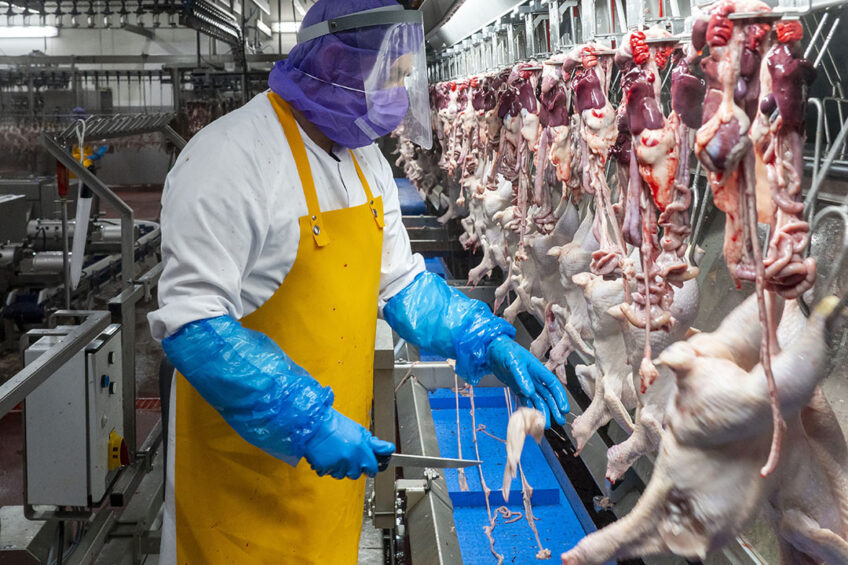Labour issues and broiler health top priorities

Poultry farmers have been urged to write to their members of parliament demanding that the UK government introduces a 12-month Covid-19 Recovery Visa to help mitigate the current labour shortage. Besides labour, broiler health was a key issue at the UK’s virtual Poultry Meat Conference.
Aimee Mahony, NFU poultry adviser, said the UK poultry sector was facing a labour shortage crisis right across the supply chain, adding that the British Poultry Council believed the present vacancy rate was more than 16%. As a result there was currently a reduction in poultry reaching retail shelves of between 5-10%, a 10% decline in all-year turkeys with the prospect of a fifth fewer turkeys being consumed at Christmas. Mahony said the issues facing the food sector ran deep and included Covid-19 and migratory labour problems, citing the publication in August of a report by accountants Grant Thornton which had urged the government to do more.
Visa programme
The report, published on behalf of the NFU, BPC, British Meat Processors Association, Food and Drink Federation, UK Hospitality and others, calls for the industry to work with the UK government to create a 12-month Covid-19 Recovery Visa to alleviate the labour shortages. This short-term response will enable the sector to work with the UK government, in parallel with the devolved administrations, on a package of measures that support training and skills development, the adoption of new technologies and career promotion. It is a package of measures that will help to put the sector on a more stable long-term footing while at the same time continuing to support the economic recovery and growth of the UK.
TVP virus
Richard Jackson, St David’s Poultry Team vet, talked about the increasing incidence of Transmissible Viral Proventricultitis (TVP) which has been seen over the winter period. The TVP virus causes discomfort to the birds with reduced feed intake and growth, leading to poor uniformity due to different degrees of thickening in different birds. Jackson said it was difficult to know which virus causes TVP, adding it could possibly be a birnavirus, an adenovirus or a picoronavirus. This meant it was extremely difficult to make a vaccine and there was none currently available for either broilers or parent stock. However, he noted that there are things that can be done on the farm to reduce the likelihood and severity of TVP. These are:
- Have as long a turnaround as possible
- Ensure that cleansing and disinfection (C+D) is audited and that formalin is used
- Hot washing appears to be of benefit
- Ensure best brooding practice: the Aviagen crop fill targets are achievable
- Ensure there is clean water
- Look for litter beetles
Avian influenza
He then touched on the past year’s avian influenza experience, saying that 2021 was the worst year for bird flu in Europe, with more than 1,200 cases in poultry. The prevalent H5N8 strain was particularly pathogenic with an index of 2.98 out of 3. And it also persisted much longer in the environment than strains from previous years (50 days at 4°C and 70 days at 20°C). In the UK, all 325 cases (310 wild birds, 5 backyard flocks, 4 turkeys, 2 breeder units, 2 ducks and 1 FR layer and game unit), were from wild birds with no poultry to poultry spread.
The Housing Order continues to be argued for and against. Free-range producers concerned about losing their status after 16 weeks are generally opposed to Housing Orders being imposed with some also saying it gives a false sense of security and leads to additional welfare challenges. Those in favour of the order, say it minimises contact between wild birds and free-range poultry and therefore minimises incursion, as well making AI more real psychologically. Biosecurity remains key but other lessons learned from the 2016/17 outbreaks include accepting that disinfection alone will not help – surfaces need to be cleaned before disinfection. Flooding/water ingress issues are very important and bedding storage and shed maintenance are other key areas of focus.
Broiler management
Jon Sargent, general manager of broiler, broiler breeder and turkey firm Hay Farms, highlighted the importance of Chick Up for newborn birds. Later problems for birds are often due to earlier causes. For example, losing birds at day 13 can often be attributed to Chick Up issues on days 1 and 2. He stressed that floor temperatures should not be too hot – 28-30°C is the right temperature – but sometimes he’s walked into sheds where the temperature is up to 34-36°C, and even 40°C. The CO2 balance must be spot on, water readings should take place every six hours and drinker heights need to be checked. “We like our drinkers to be low initially, for the first 20 minutes or so, and then once the birds have found them, they can come up 2,3 or 4 clicks.” The company tends to add cardboard as an enticement to get the birds feeding on the floor. “Get Chick Up right and the birds may be robust enough to deal with later issues,” he said.












